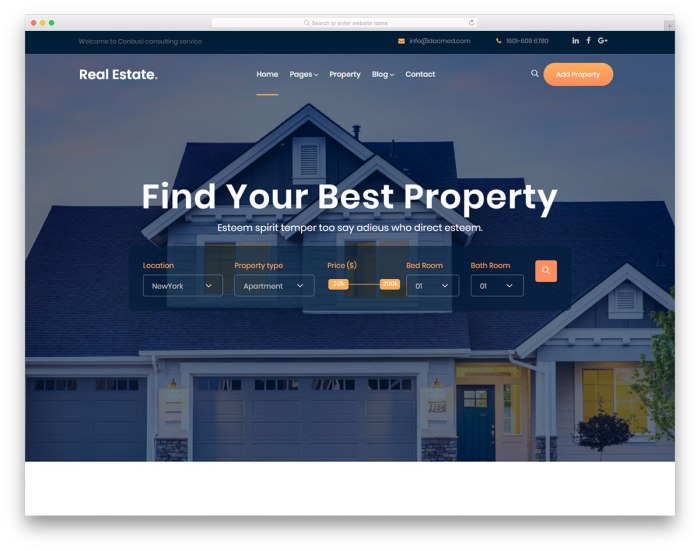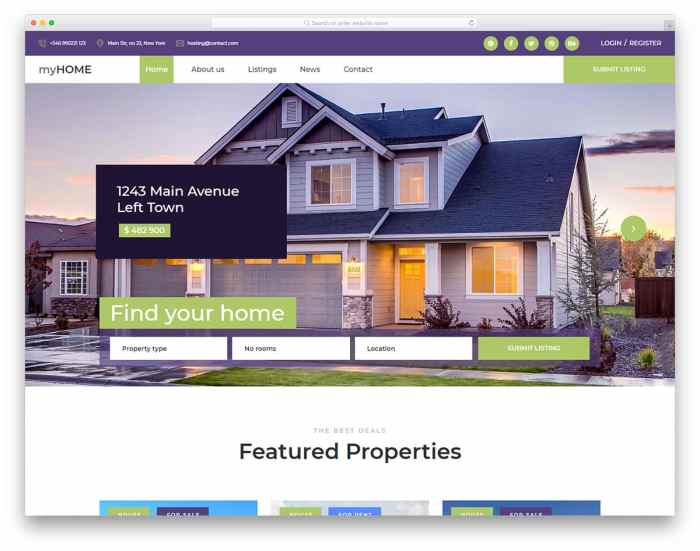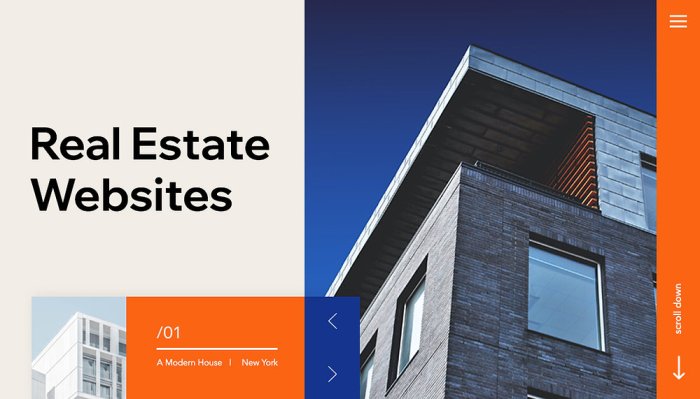Crafting a Stellar Real Estate Agent Website: Key Strategies for Success
"In the competitive world of real estate, having a top-notch website can make all the difference. From boosting credibility to attracting potential clients, the role of a professional website is paramount for agents looking to thrive in the market. Dive into this guide to discover essential features, engaging content strategies, optimization tips, and more for creating a standout real estate agent website."
Importance of a Real Estate Agent Website

Having a professional website is crucial for real estate agents in today's digital age. It serves as a powerful tool to establish credibility, increase visibility in the market, and attract potential clients.
Enhancing Credibility and Visibility
A well-designed website can showcase an agent's expertise, experience, and success stories. By providing valuable information about the real estate market, local neighborhoods, and the buying/selling process, a website can position an agent as a trusted authority in the industry.
- Displaying client testimonials, awards, and certifications can further enhance the agent's credibility.
- Optimizing the website for search engines can improve visibility and help potential clients find the agent online.
- Regularly updating the website with fresh content, such as blog posts or market reports, can demonstrate the agent's knowledge and commitment to serving clients.
Attracting Clients and Generating Leads
A real estate agent website acts as a 24/7 marketing tool that can attract leads and convert them into clients.
- Providing detailed property listings with high-quality photos and virtual tours can capture the interest of potential buyers.
- Offering valuable resources, such as mortgage calculators, buying guides, and neighborhood profiles, can engage visitors and encourage them to reach out to the agent for assistance.
- Implementing lead capture forms and contact information prominently on the website can make it easy for visitors to inquire about properties or schedule consultations.
Essential Features for a Real Estate Agent Website
To effectively showcase properties and attract potential clients, a real estate agent's website must have essential features that enhance user experience and provide valuable information. These features are crucial for establishing credibility and building trust with visitors.
Property Listings
- Display a wide range of properties with detailed descriptions, high-quality images, and virtual tours if possible.
- Include search filters for users to easily find properties based on their preferences, such as location, price range, number of bedrooms, etc.
- Regularly update listings to ensure accuracy and showcase the latest available properties.
Contact Form and Inquiry Management
- Integrate a contact form that allows visitors to reach out easily for inquiries or to schedule viewings.
- Implement a system to manage inquiries efficiently, ensuring timely responses and personalized communication with potential clients.
Testimonials and Reviews
- Showcase testimonials from satisfied clients to build credibility and trust with new visitors.
- Encourage clients to leave reviews on the website or third-party platforms to establish a positive reputation.
Responsive Design and User-Friendly Navigation
Having a responsive design ensures that the website adapts to various devices, such as smartphones, tablets, and desktops, providing a seamless experience for users. User-friendly navigation makes it easy for visitors to explore the website, find information quickly, and contact the real estate agent effortlessly.
Creating Engaging Content for a Real Estate Website
To make a real estate agent's website stand out and attract potential clients, it is crucial to include engaging content that showcases properties effectively and provides valuable information to visitors.
Type of Content for a Real Estate Agent’s Website
- Property Listings: Detailed descriptions, high-quality images, and virtual tours can help potential buyers visualize the property.
- Neighborhood Guides: Provide information about the surrounding area, including schools, amenities, and local attractions to give buyers a sense of the community.
- Market Updates: Keep clients informed about the latest trends and developments in the real estate market to establish credibility and expertise.
Strategies for Creating Engaging Property Listings and Neighborhood Guides
- Use Descriptive Language: Highlight unique features of the property and neighborhood to capture the buyer's interest.
- Include High-Quality Images: Professional photos showcasing the property from different angles can make a significant impact on potential buyers.
- Virtual Tours: Offering virtual tours allows buyers to explore the property remotely and get a feel for the layout and flow of the space.
Tips on Incorporating Videos, Virtual Tours, and High-Quality Images
- Utilize Videos: Create engaging property videos to showcase the property's features and give a virtual walkthrough to potential buyers.
- Virtual Tours: Interactive 3D tours provide a more immersive experience for buyers, allowing them to navigate through the property at their own pace.
- High-Quality Images: Invest in professional photography to capture the property in the best light and make a lasting impression on visitors.
Optimizing for Real Estate Agent Websites
Search Engine Optimization () plays a crucial role in helping real estate agent websites rank higher on search engine results pages, ultimately increasing visibility and attracting more potential clients.
Importance of for Real Estate Websites
Implementing strategies on a real estate agent website is essential for improving online presence and standing out in a competitive market. Here are some best practices to optimize :
- Utilize relevant s: Incorporate popular and location-specific s in website content to enhance visibility in search results.
- Create high-quality content: Develop informative and engaging content that provides value to visitors, encouraging them to stay on the website longer.
- Optimize meta tags: Include relevant s in meta titles and descriptions to improve click-through rates from search engine results.
- Improve website speed: Ensure fast loading times to enhance user experience and reduce bounce rates, which can positively impact rankings.
Significance of Local for Real Estate Agents
Local focuses on optimizing a website for specific geographical locations, making it easier for real estate agents to target clients in their service areas. Here's how local can benefit real estate agents:
- Target local s: Use location-specific s to attract potential clients searching for real estate services in a particular area.
- Create Google My Business profile: Claiming and optimizing a Google My Business listing can improve visibility in local search results and Google Maps.
- Obtain online reviews: Encourage satisfied clients to leave reviews on platforms like Google, Yelp, and Facebook to build credibility and attract more local clients.
- Implement schema markup: Adding schema markup to the website can help search engines better understand local business information, improving chances of appearing in local search results.
Utilizing Social Media Integration

Integrating social media on a real estate website can significantly benefit agents by increasing visibility, reaching a wider audience, and engaging with potential clients in a more interactive way. Social media platforms provide a powerful tool for showcasing property listings, sharing valuable content, and establishing credibility in the industry.
Effective Social Media Strategies for Real Estate Marketing
- Regularly post high-quality images and videos of properties to grab attention and generate interest.
- Engage with followers by responding to comments, messages, and inquiries promptly to build relationships and trust.
- Utilize targeted advertising on platforms like Facebook and Instagram to reach specific demographics and potential buyers.
- Create informative and engaging content such as blog posts, virtual tours, and market updates to position yourself as an expert in the real estate market.
- Collaborate with influencers, real estate experts, and industry professionals to expand your reach and credibility.
Impact of Social Proof and User-Generated Content
Social proof, such as positive reviews, testimonials, and endorsements from satisfied clients, can significantly boost an agent's online presence by building credibility and trust among potential clients. User-generated content, like client testimonials, before-and-after photos, and success stories, can create a sense of authenticity and reliability, influencing others to choose your services over competitors.
Closing Summary

"As you navigate the intricate landscape of real estate agent websites, remember that a well-crafted online presence can be the key to unlocking success in this dynamic industry. By implementing the strategies Artikeld in this guide, you can elevate your website to new heights and stand out in a crowded digital space."
FAQ Insights
"What are the key features every real estate agent website should have?"
"Key features include property listings, neighborhood guides, responsive design, user-friendly navigation, and high-quality images."
"How important is for real estate agent websites?"
" is crucial for increasing visibility and attracting clients. Optimizing website content and meta tags can significantly impact search engine rankings."
"What is the significance of social media integration for real estate websites?"
"Integrating social media can enhance marketing efforts, increase engagement, and provide social proof to potential clients."